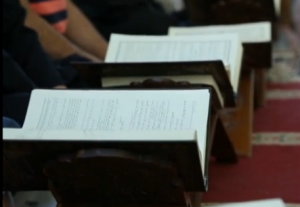
(Reuters) — Respect for and protection of freedom of religious belief is China’s long-term basic national policy, stated the white paper “Freedom of Religious Belief in Xinjiang” published by the State Council on Thursday.
The paper said Chinese laws protect normal religious activities. Citizens can have all normal religious activities in their own homes or at religious venues in accordance with the customary religious practices, including going to prayers, Ramadan, worshiping Buddha and other activities. These activities are exclusive affairs of religious groups and the believers themselves. They are protected by laws, and no organizations or individuals may interfere with them.
To ensure successful pilgrimages for believers in Islam, the Xinjiang Uygur Autonomous Region in northwest China adopts a policy of organized and planned pilgrimages. Since 1996 the Xinjiang government has arranged charter flights every year to take believers in Islam to Mecca in Saudi Arabia. It has funded medical care, interpretation and other services to the pilgrims to ensure safe and orderly pilgrimages, the paper said.
During the holy Islamic period of Ramadan, whether to close or open halal restaurants is completely determined by the owners themselves without interference. There are mosques with a tradition of having iftar (the evening meal when Muslims end their daily Ramadan fast at sunset) and a number of religious believers provide free iftar to fasting people. Local governments will ensure that all religious activities during Ramadan go on in an orderly manner, it added.
“Xinjiang now has 47 ethnic groups, including the Uygur, Han, Kazak, Hui, Mongol and other groups. Our population now stands at 23 million. We have Islam, Buddhism, Taoism and Christianism. There are 24,800 different religious venues in Xinjiang, with 29,300 religious personnel. The number of Islamic mosques is 24,400 and the Islamic religious personnel is 29,000. We also have eight religious institutions and 112 religious groups,” said Shewket Imin, an official with the Xinjiang regional committee of the Communist Party of China, at a press conference elaborating on the white paper.
At the same time, Xinjiang plays an active role in communicating with international religious organizations on the basis of mutual respect, equal and friendly attitudes. Xinjiang and its people are open and welcome any foreign religious groups and individuals who respect China’s sovereignty and religious policy, the paper added.
The white paper also introduced Xinjiang’s religious groups taking part in international activities and winning awards at Koran reading competitions. They go out to many countries to introduce Xinjiang’s developments and freedom of religious belief, it said.








